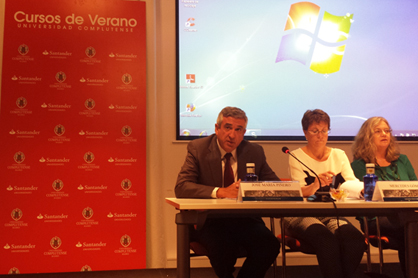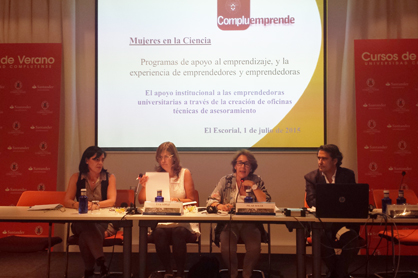Science resists gender equality
 Summer Course “Women in Science”, organized by the Complutense University in Madrid within the EEA Grants NILS Science and Sustainability Programme made it clear that, despite the advances, there is still a long way to go towards gender equality in science and technology.
Summer Course “Women in Science”, organized by the Complutense University in Madrid within the EEA Grants NILS Science and Sustainability Programme made it clear that, despite the advances, there is still a long way to go towards gender equality in science and technology.
10.07.2015
60% of university students in Spain are women but 82% of the university chairs are for men. Women constitute the overwhelming majority in all the university degrees, except the technical ones where account for barely 27%. 76% of the CSIC researchers are men. These are only a few number presented in the Complutense University Summer Course “Women in Science. Reflections and experiences from the north and south of Europe and the United States”, organized within the EEA Grants NILS Science and Sustainability Programme, which concluded last 3rd July. Although the speakers agreed with the fact that progress has been made, there is still a long way to go towards gender equality in science and technology, not only in Spain but in Europe.
General Director of Community Funds, José María Piñero, opened the course, whose objective was to showcase the women’s reality in science world and to share experiences in order to change the figures. “Gender equality is one of the keystones of the management of the European funds in Spain and in the EEA Grants”, highlighted. The Cultural and Press attaché of the Norwegian Embassy, Lotte K. Tollefsen, pointed out that “investing in science and education is crucial for the economy”. Mercedes Gómez, Vice-Principal for Academic Policy in the Complutense University, added that “the idea that women are underrepresented in science because their lack of interest or poor effort must be eradicated”.
Prominent scientist in Spain, such as Eulalia Pérez Sedeño, Amelia Valcárcel or Inés Sánchez de Madariaga; from Norway, Ma Li; from Iceland, Thamar Melanie Haijstra, and United States, Catherine Didion, shared their experiences in order to improve the women’s role in science and technology.
 During the Summer Course, initiatives to encourage scientific entrepreneurship were presented. For example, Compluemprende, whose director, Gustavo Lejarriaga, explained that in this counselling office more women than men are assisted but there is still a scarce women presence in science and technology, and, above all, entrepreneurship is more and obligation than a vocation. Initiatives such as Entrepreneurship Master in Norway, presented during one of the roundtables, financed by the State and by the private sector, can be an example to follow.
During the Summer Course, initiatives to encourage scientific entrepreneurship were presented. For example, Compluemprende, whose director, Gustavo Lejarriaga, explained that in this counselling office more women than men are assisted but there is still a scarce women presence in science and technology, and, above all, entrepreneurship is more and obligation than a vocation. Initiatives such as Entrepreneurship Master in Norway, presented during one of the roundtables, financed by the State and by the private sector, can be an example to follow.
EEA Grants are also contributing to foster female entrepreneurship, with projects such as the Incyde Foundation which aims at promoting self-employment in sectors where women are underrepresented.
Besides, María Teresa García Nieto, professor in the Faculty of Information Sciences (complutense University), presented the book Women, Science and Information, a portrait of the female researchers appearances in media. The conclusions are clear. “70% of the references are related to men". The male scientists are described with adjectives such as “successful” or “famous”. Women instead appear in the media aseptically, emphasizing the scientific discovery and leaving their figure aside.
This course is part of the Bilateral Relations Plan of the EEA Grants NILS Science and Sustainability Programme, operated by Universidad Complutense of Madrid, whose aim is fostering scientific research through researchers mobility between Spain, Norway, Iceland and Liechtenstein.